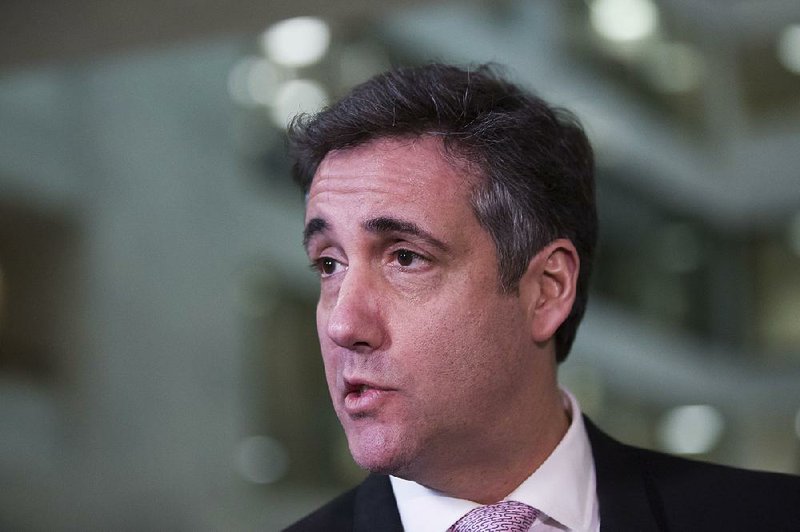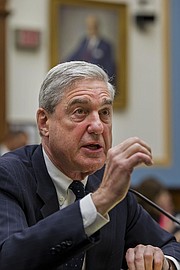Federal authorities investigating Russian interference in the 2016 presidential election obtained search warrants for emails of Michael Cohen, President Donald Trump's former lawyer, beginning in July 2017, according to documents released Tuesday that provide a glimpse into the earliest stages of the inquiry.
The documents show that Cohen's business dealings had already been the subject of an extensive investigation by the time FBI agents conducted a raid on his home and office nine months later, in April of last year.
They also show how little the public knew about the Russian investigation in real time as prosecutors zeroed in on Cohen, revealing some of the investigative steps they took to obtain evidence through search warrants in Washington and New York.
Prosecutors, for instance, unearthed bank payments from a New York investment firm tied to Viktor Vekselberg, a billionaire Russian businessman with ties to the Kremlin who met with Cohen in his Trump Tower office just days before the inauguration, the documents show.
The public did not learn of those payments, or that special counsel Robert Mueller's prosecutors later interviewed Vekselberg, until almost a year later.
The records, including search warrants and materials related to the April raid, were among hundreds of pages of documents released in response to a request by The New York Times and other news organizations.
Lanny Davis, a lawyer for Cohen, said in a statement Monday night that the release furthered Cohen's "interest in continuing to cooperate and providing information and the truth about Donald Trump and the Trump organization to law enforcement and Congress."
One newly released search warrant said the FBI and Manhattan federal prosecutors were investigating Cohen for a range of crimes, including defrauding several banks dating to 2016 and a scheme "to make an illegal campaign contribution in October 2016 to then-presidential candidate Donald Trump." The warrant also indicated they were investigating him for wire fraud and conspiracy.
The documents give a rough timeline of how the Cohen investigation unfolded. Starting in July 2017, two months after Mueller's appointment, and stretching through November, his office obtained three search warrants for Cohen's emails and another for his iCloud account from a federal judge in Washington.
Investigators sought permission to gather data for the period beginning Oct. 1, 2016, and ending Nov. 8, 2016 -- the day of the presidential election -- and then again for the period starting Jan. 1, 2018, and ending with the warrant's issuance.
In their investigation, Mueller's prosecutors also obtained Cohen's telephone records and used a high-tech tool known as a Stingray or Triggerfish to pinpoint the location of his cellphones.
By February 2018, Mueller's office had referred aspects of its investigation to federal prosecutors in Manhattan. Two months later, the raid on Cohen's office and home in New York took place.
FBI agents who scoured Cohen's hotel room and safe-deposit box seized more than 4 million electronic and paper files, more than a dozen mobile devices and iPads, 20 external hard drives, flash drives and laptops.
Both Cohen and Trump cried foul at the time over the raids, with Cohen's attorney calling them "completely inappropriate and unnecessary" and the president taking to Twitter to declare that "Attorney-client privilege is dead!"
A court-ordered review ultimately found only a fraction of the seized material to be privileged.
Late last year, Cohen pleaded guilty to violating campaign-finance laws, financial crimes and lying to Congress in two separate prosecutions, one filed by the U.S. attorney's office for the Southern District of New York and the other by Mueller's office.
Cohen, 52, apologized at his sentencing in December, blaming himself for "my own weakness and a blind loyalty" to Trump that he said had led him "to choose a path of darkness over light."
Cohen cooperated -- partially -- with federal prosecutors in New York, as well as with Mueller, in hopes of reducing the amount of prison time he would have to serve.
Cohen has provided information to investigators about Trump and the Trump campaign, but prosecutors said he refused to tell them everything he knew.
Judge William Pauley III sentenced Cohen to three years in prison. He is scheduled to begin serving his sentence May 6 after Pauley granted him a two-month delay in his surrender date because of pending shoulder surgery and his need to prepare for testimony before three congressional committees.
Cohen testified Feb. 27 in a daylong public hearing before the House Oversight and Reform Committee about what he described as Trump's lies about his business interests in Russia and his role in the payment of hush money to an adult-film actress who claimed to have had an affair with Trump. Cohen called the president a racist, a con man and a cheat.
The search materials were made public at the order of Pauley. Last fall, when the Times and other news organizations asked the judge to unseal the materials, the government opposed such action.
Prosecutors cited the "need to protect an ongoing law enforcement investigation" and the privacy of "numerous uncharged third parties."
Pauley ultimately ordered the government to provide him with copies of the sealed materials and proposed redactions. On Monday, after saying he had reviewed and approved the redactions, he ordered the government to file the redacted copies on the public court docket.
The judge also said he would revisit the documents' secrecy in the near future, directing prosecutors to provide him with a confidential update by May 15.
Information for this article was contributed by Benjamin Weiser and William K. Rashbaum of The New York Times; by Devlin Barrett, Matt Zapotosky and Rosalind S. Helderman of The Washington Post; and by Jim Mustian and Larry Neumeister of The Associated Press.
A Section on 03/20/2019


